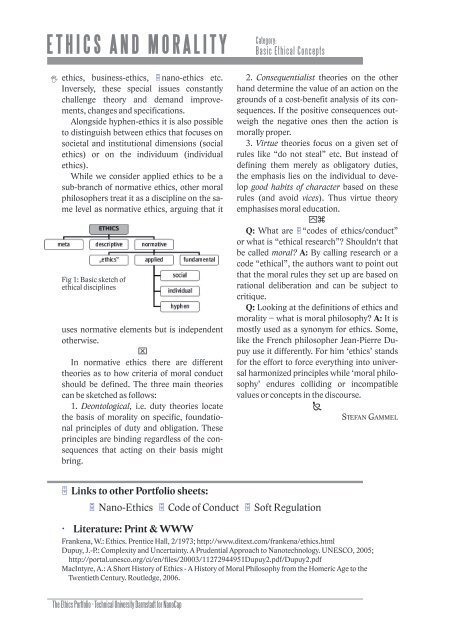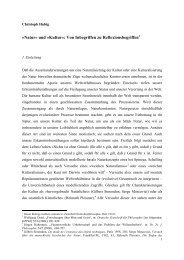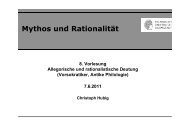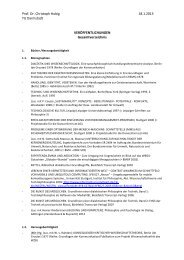ETHICS AND MORALITY Category: - Institut für Philosophie
ETHICS AND MORALITY Category: - Institut für Philosophie
ETHICS AND MORALITY Category: - Institut für Philosophie
Create successful ePaper yourself
Turn your PDF publications into a flip-book with our unique Google optimized e-Paper software.
<strong>ETHICS</strong> <strong>AND</strong> <strong>MORALITY</strong><br />
<br />
ethics, business-ethics, nano-ethics etc.<br />
Inversely, these special issues constantly<br />
challenge theory and demand improvements,<br />
changes and specifications.<br />
Alongside hyphen-ethics it is also possible<br />
to distinguish between ethics that focuses on<br />
societal and institutional dimensions (social<br />
ethics) or on the individuum (individual<br />
ethics).<br />
While we consider applied ethics to be a<br />
sub-branch of normative ethics, other moral<br />
philosophers treat it as a discipline on the same<br />
level as normative ethics, arguing that it<br />
Fig 1: Basic sketch of<br />
ethical disciplines<br />
uses normative elements but is independent<br />
otherwise.<br />
<br />
In normative ethics there are different<br />
theories as to how criteria of moral conduct<br />
should be defined. The three main theories<br />
can be sketched as follows:<br />
1. Deontological, i.e. duty theories locate<br />
the basis of morality on specific, foundational<br />
principles of duty and obligation. These<br />
principles are binding regardless of the consequences<br />
that acting on their basis might<br />
bring.<br />
Links to other Portfolio sheets:<br />
The Ethics Portfolio - Technical University Darmstadt for NanoCap<br />
<strong>Category</strong>:<br />
Basic Ethical Concepts<br />
2. Consequentialist theories on the other<br />
hand determine the value of an action on the<br />
grounds of a cost-benefit analysis of its consequences.<br />
If the positive consequences outweigh<br />
the negative ones then the action is<br />
morally proper.<br />
3. Virtue theories focus on a given set of<br />
rules like “do not steal” etc. But instead of<br />
defining them merely as obligatory duties,<br />
the emphasis lies on the individual to develop<br />
good habits of character based on these<br />
rules (and avoid vices). Thus virtue theory<br />
emphasises moral education.<br />
<br />
Q: What are “codes of ethics/conduct”<br />
or what is “ethical research”? Shouldn‘t that<br />
be called moral? A: By calling research or a<br />
code “ethical”, the authors want to point out<br />
that the moral rules they set up are based on<br />
rational deliberation and can be subject to<br />
critique.<br />
Q: Looking at the definitions of ethics and<br />
morality − what is moral philosophy? A: It is<br />
mostly used as a synonym for ethics. Some,<br />
like the French philosopher Jean-Pierre Dupuy<br />
use it differently. For him ‘ethics’ stands<br />
for the effort to force everything into universal<br />
harmonized principles while ‘moral philosophy’<br />
endures colliding or incompatible<br />
values or concepts in the discourse.<br />
<br />
Nano-Ethics Code of Conduct Soft Regulation<br />
STEFAN GAMMEL<br />
Literature: Print & WWW<br />
Frankena, W.: Ethics. Prentice Hall, 2/1973; http://www.ditext.com/frankena/ethics.html<br />
Dupuy, J.-P.: Complexity and Uncertainty. A Prudential Approach to Nanotechnology. UNESCO, 2005;<br />
http://portal.unesco.org/ci/en/files/20003/11272944951Dupuy2.pdf/Dupuy2.pdf<br />
MacIntyre, A.: A Short History of Ethics - A History of Moral Philosophy from the Homeric Age to the<br />
Twentieth Century. Routledge, 2006.
















